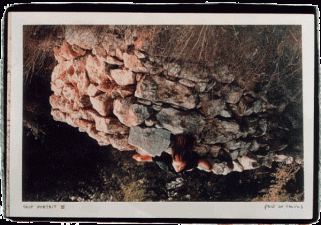
“I am the Lorax and I speak for the trees.” What would nature’s ambassador tell us? Children’s author Theodore Seuss Geisel (Dr. Seuss) used this question as inspiration for his classic ecological fable, The Lorax. His simple message is that when limited resources (such as truffula trees) are consumed without care, entire ecosystems (singing fish, brown barbaloots…) can vanish and paradise is lost.
This tragic tale was panned by some critics for being too apocalyptic and probably inappropriate for children. The 2012 movie loosely based on The Lorax is… well, it’s difficult to know where to begin. So let’s look back at the book and I’ll try to explain why I believe its message will resonate long after the movie is a forgotten tuft of Hollywood fluff.
The original Lorax
The message of the original Lorax was stark. Perhaps Dr. Seuss did stray into the kind of dystopian environmentalism which triggers helplessness at least as often as it inspires activism. But his message is surprisingly relevant to the problems of our time. Forests, minerals, oil, water and fisheries are being consumed much faster than nature can replace them. Thousand year old ecosystems and million year old resource deposits are being converted into a few months profit, leaving environmental and economic wastelands.
When The Lorax was first published in 1971, the Pacific paradise of Nauru was a phosphate mining rentier state with the highest per-capita wealth in the world. Its citizens hadn’t yet relived the fictional Once Ler’s mistake by having their homeland mined from beneath their feet. In 1971 ocean cod catch was peaking at 800,000 tons per year.
Two decades later it would collapse to less than 1/10th of this. Deforestation was also proceeding at a breakneck pace as the world fell below one acre of healthy forest per person. Minamata Bay was a distant memory. Love Canal, Times Beach, Bhopal, Chernobyl and numerous oil spills from the Mideast to the arctic were in the unimaginable future. In light of all that has happened since The Lorax was published, I believe it undersold the dangers of rampant resource commercialization.
The movie: FAIL
I really wanted to like The Lorax movie. Its greatest failing is that it squanders the limited resource of an audience’s attention span. Hollywood directors understand that their art can teach, persuade and inspire. This power must be used wisely. For example, Finding Nemo (2003) was a beautiful film which tried to teach us that it is wrong to poach fish from coral reefs. Instead, it convinced hundreds of children to flush tropical fish down their toilets. The failings in The Lorax (2012) aren’t coherent enough to lead to a mass flushing, but you’ll wish the editor had left a few scenes on his compost heap.
The movie begins in sterile Thneedville where even the trees are made of plastic and where a businessman named O’Hare profits from selling bottled air. The protagonist Ted (Zac Efron) is inspired to seek trees not because he has any intrinsic interest in nature, but because his heartthrob Audrey (Taylor Swift), shows a love for trees through her art. Both Granny (Betty White) and the mysterious Once-Ler remember trees, but neither the characters nor the writers seem to have the vaguest interest in actual nature. Ted is confined to a big-wheeled motorcycle throughout movie. Have animators forgotten how to make their characters walk?
The graphics and special effects were jarring, manic, flat and occasionally beautiful. I’m thankful that I didn’t see this movie in 3D, but the waterfall scene was made for this hideous format. Much of the rest of the movie barely crawled above one dimension. I can only hope that whoever dubs this into Middle Eastern languages will correct the haphazard casting.
Danny DeVito is the voice of the Lorax, Ed Helms is the Once-Ler and Rob Riggle is Mr. O’Hare. O’Hare bears a passing resemblance to a young Danny DeVito, so one wonders if this was a last minute voice swap. My eight-year-old daughter wondered why O’Hare is in the movie at all. By introducing this villain, the writers distance the audience from any responsibility in causing the smogulous smoke.
Like a sweet and empty soft drink ad
The O’Hare subplot attacked the commercialization of free natural resources such as water and air. Such commercialization is one of my pet peeves, so here the movie was preaching to the converted. But this preaching was another part of the problem. In an interview with Reading Rockets, Theodore Seuss Geisel’s widow Audrey said that every Dr. Seuss book contained a message and that Theodore would often ask if he was preaching too much. Occasionally he was, but each message was wrapped inside a book full of fun fantasy art and sing-song rhymes.
By contrast, the 2012 movie only used a few lines of Seuss’s fun sing-song poetry and his art took a back-seat to typical 3D computer animation. The bad soundtrack pasted over this muddled morass of artificially sweetened messages did nothing to dampen the feeling of being buried in preachiness. The movie’s pale sarcasm completely misses the mark and the “cute” singing fish and barbaloots couldn’t begin to compensate for this weak screenplay. Only the final song and dance, “Let it Grow” was somewhat redeeming, resembling the 1970s soft drink ad, “I’d Like to Teach the World To Sing.”
That about sums it up, as sweet and empty as a 1970s soft drink ad. But don’t blame the writers, director, producers and actors for the sad state of this film. This is just what happens when a movie with an anti-commercialization message is churned out of the Hollywood commercialization empire.
And unless someone cares a whole awful lot, this isn’t going to get any better, it’s not. So my advice to you is please skip this movie and the plastic merchandise too.
The Lorax (1971 book) *****
The Lorax (2012 film) *
(The book is always better than the movie, isn’t it?)
More Movie Reviews:
Free Movie: First Earth – Uncompromising Earth Architecture
A Camel Film With Big Heart – Collective Moments of Madness
Exploring Human Apathy in the Age of Stupid




This piece of writing provides clear idea in support of
the new viewers of blogging, that actually how to do running a blog.
I savour, cause I found just what I was having a look for.
You’ve ended my 4 day lengthy hunt! God Bless you man. Have a nice day.
Bye
If you want to obtain a great deal from this article
then you have to apply such methods to your won web site.
I have to agree with Brian. I started watching the movie with my daughter and quickly lost interest. I couldn’t feel Seuss in there at all, and it was way too flashy, and noisy. Listening to it from the sidelines made me feel aching boredom. The songs were mediocre and all the graphics and movement made it too Hollywood for the people who would and should appreciate a movie about the Lorax. Not convinced it would convert any new young followers to the green movement, but hey I didn’t see the end so I could be wrong.
This review is way off the mark particularly in regard to the graphics, special effects, and sound track. I think the authors biggest gripe is the message is not green enough. I’ve seen the movie several times with my kids and believe it is good and tries earnestly to impart an environmental message. The movie deserves more than the one star that the author gave it. The book was written over 40 years ago and the movie did not need to stay true to the letter of the book to have a similar impact. This was not Peter Jackson’s interpretation of Lord of the Rings. This was an interpretation of a children’s book with a message that was never child-like. Dr. Seuss seemed to have a purpose beyond the scope of his audience when he wrote this. There is a reason why Earth Day came about in 1970.